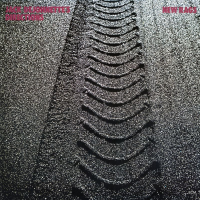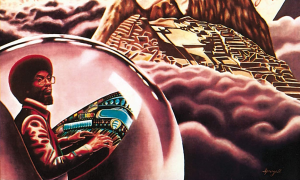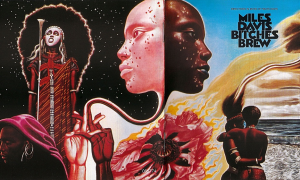Home » Jazz Articles » Rediscovery » Jack DeJohnette's Directions: New Rags
Jack DeJohnette's Directions: New Rags
 Jack DeJohnette's Directions
Jack DeJohnette's DirectionsNew Rags
ECM Records
1977
Today's Rediscovery is an album that, despite never being released officially on CD, is a relatively regular play chez Kelman, getting spun at least a couple times every year. New Rags (ECM, 1977), the third and, sadly, final recording by drummer Jack DeJohnette's Directions group, pares down the quintet of its second album and ECM debut, Untitled, to a quartet. Cosmic Chicken's bassist, Peter Warren, was replaced by Mike Richmond for Untitled (ECM, 1976), but its keyboardist, Warren Bernhardt, was eliminated from the Directions lineup, following his sole recorded appearance in the group, on New Rags.
The Chicago-born DeJohnette is left, on New Rags, alongside guitarist (and fellow ECM label mate) John Abercrombie, the lesser known but busy session saxophonist Alex Foster and Richmond, another name less familiar to casual jazz fans but with a sizeable discography to suggest plenty of name power amongst musicians. It's an album that, perhaps even more than its similarly broad- scoped predecessor, succeeds in positioning DeJohnette beyond being "just" one of jazz's most impressive drummers. Even at this relatively early stage (about a decade) in the then 35 year-old drummer's career, DeJohnette had already clocked up two major gigs, one with saxophonist Charles Lloyd, the other with trumpeter Miles Davis. But here, as with the earlier Directions dates, the drummer emerge as a composer, instrumentalist and bandleader of increasing significance.
DeJohnette and Abercrombie were already good friends by this time, the guitarist having played on the drummer's two Prestige dates, 1974's Sorcery and 1975's Cosmic Chicken. Neither album was particularly well-received, but DeJohnette nevertheless returned the favor by appearing on the guitarist's 1975 ECM leader debut, Timeless, an album that quickly became a classic for both Abercrombie and the label. The same year, DeJohnette and Abercrombie also began their on-again/off-again collaborative trio, Gateway, with bassist (and fellow Miles Davis alum) Dave Holland, delivering its critically acclaimed, eponymous ECM debut the following year.
But if Timeless's combined exploration of keyboard-driven electricity and stripped down acoustic elegance, Gateway found that unique nexus where Holland's predilection for groove met with the freewheeling trio's collective improvisational chemistry. New Rags, in contrast, explores three DeJohnette compositions of remarkable diversity, alongside Foster's more harmonically ambiguous but potently swinging "Flys," and "Steppin' Through." A rocking, near (but not quite) fusion powerhouse that closes the album on a supremely fiery note, "Steppin' Through" moves from pedal-to-the-metal intensity as Foster's opening salvo finds its way to more spacious, open terrain, only to return to its unrelenting, riff-driven intro for a nuclear solo from Abercrombie. Pushed to even greater extremes by DeJohnette's cymbal-heavy power groove before the entire quartet brings things down for an ultimate fade-out, it's one of the guitarist's best of the set, overdriven and utterly unfettered.
One of DeJohnette's most enduring qualities as a writer throughout the years has been the wry sense of humor that has imbued many of his best compositions, like "One for Eric" and "Zoot Suite," both from the drummer's eponymous 1980 debut of the twin-saxophone (and occasionally trumpet)-driven Special Edition group, whose four ECM recordings were reissued aa one of the label's Old & New Masters Edition box sets, Special Edition (2013). Indeed, New Rags waxes lyrical on "Lydia," a gorgeous ballad named after the drummer's wife, and which features DeJohnette on piano. But it's the episodic title track where DeJohnette drives his group to seamlessly shift gears between ambling free bop, challenging stop/start compositional segues and brief moments of bump-and-grind burlesque, along with an irregularly metered calypso conclusion that may seem like a non sequitur, but ultimately makes perfect sense in DeJohnette's stylistically unbound and, in this case, witty musical universe.
It's not particularly uncommon for drummers to play piano, but few are as good as DeJohnette, who could easily have focused his energy on that instrument rather than drums with similar success. Still, we'll never know, as it's an instrument he only brings out occasionally, though when he does, as he does, as on "Lydia," he invariably demonstrates a strong penchant for melodic specificity. "Lydia" foreshadows an even more memorable ballad, "Silver Hollow," from the drummer's reconfigured New Directions group (with only Abercrombie remaining) and its 1978 ECM debut, New Directions, where the pianist delivers a near-standard that has remained in his live repertoire across the the ensuing decades.
The lengthy, open-ended "Minya's the Mooch," named after his young daughter and a play on "Minnie the Moocher," made famous by Cab Calloway, opens New Rags with Richmond's elliptical, visceral bass line anchoring an atmospheric collection of delicate cymbals and volume pedal-swelling guitar. Foster enters with seemingly effortless aplomb, initially pushing the group towards a fiery double time section. The track ultimately dissolves, however, into a melée of apparent chaos, except that a cued figure reveals far more method than madness, as it leads to a closing section and return to the intro's more ethereal atmospherics.
How the entire group moves through such varied passages with a single voice, often within the same composition, is what makes Directions such a memorable group. Building on the success of Untitled, the reduced Directions lineup on New Rags delivers an even more impressive sophomore effort for ECM. What's less impressive, however, is that both Untitled and New Rags remain unavailable, and would make a perfect double-disc set to bring all of DeJohnette's albums as a leader on ECM into print on CD.
Until that happens, however, both albums (equally worthy of Rediscovery but with New Rags beating Untitled out by a hair) are enjoyed, chez Kelman, in a vinyl>CDR transfer that sounds absolutely wonderful on his Tetra Listening Instruments. ECM's painstaking attention to sonic transparency and pristine clarity is a particularly beautiful thing to behold here, on a record that covers considerable dynamic territory, and is all the better for it.
So, what are your thoughts? Do you know this record, and if so, how do you feel about it?
[Note: You can read the genesis of this Rediscovery column here.]
Tags
Jack DeJohnette's Directions
Rediscovery
Jack DeJohnette
John Kelman
ECM Records
United States
New York
Poughkeepsie
Mike Richmond
Warren Bernhardt
John Abercrombie
Alex Foster
charles lloyd
Miles Davis
Dave Holland
Cab Calloway
PREVIOUS / NEXT
Support All About Jazz
 All About Jazz has been a pillar of jazz since 1995, championing it as an art form and, more importantly, supporting the musicians who make it. Our enduring commitment has made "AAJ" one of the most culturally important websites of its kind, read by hundreds of thousands of fans, musicians and industry figures every month.
All About Jazz has been a pillar of jazz since 1995, championing it as an art form and, more importantly, supporting the musicians who make it. Our enduring commitment has made "AAJ" one of the most culturally important websites of its kind, read by hundreds of thousands of fans, musicians and industry figures every month.

























